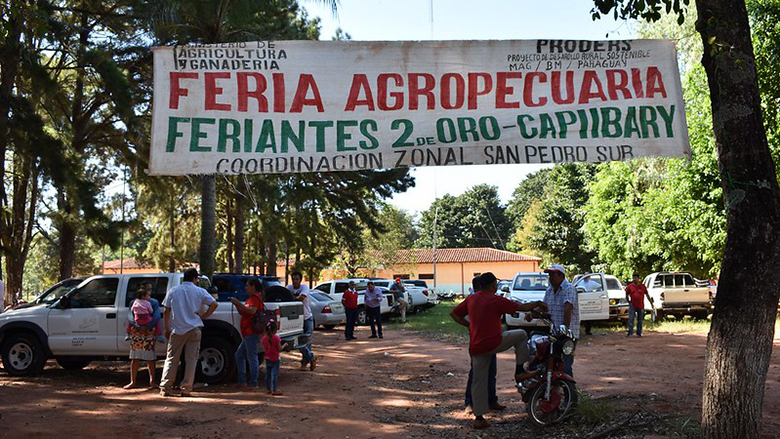Challenge
Despite a continuous decline of poverty rates since the beginning of the twenty-first century, Paraguay experienced a reversal trend in 2020 due to the COVID-19 pandemic, with moderate poverty reaching 26.9 percent and an additional 265,500 people to fall below the poverty line. Poverty tends to be concentrated in rural areas: almost one-third of the rural population (33.86 percent) live in poverty, compared to 22.7 percent in urban areas. Extreme poverty reached 7.39 percent, affecting mostly people living off agriculture and exposed to climate shocks.
Given Paraguay’s economic dependence on agriculture and livestock, the use and management of land has a notable impact on production, livelihoods, and natural resources. The land situation in Paraguay today is characterized by significant inequality in tenancy and extensive titling irregularities. Smallholder farmers are constrained by limited access to land and technologies, and to adequate human and social capital resources. This situation not only makes it extremely difficult for small-scale farmers to diversify their production, but it also incentivizes unsustainable agricultural practices (i.e., slash-and-burn agriculture and monoculture) leading to environmental degradation that further negatively affects crop productivity and rural families’ well-being.
Approach
The Sustainable Agriculture and Rural Development Project (PRODERS) aimed to sustainably improve the quality of life of targeted small-scale farmers and Indigenous communities by supporting actions that strengthened their community organizations, self-governance, and access to markets and value chains.
PRODERS designed a training program to improve the level of professionalization of producers’ organizations and financed subprojects to increase yields and diversify agriculture systems, as well as social, environmental, and community investment. Subprojects were categorized into four financing windows: (i) Community Investment Plans (PIC), which included trainings in good agriculture practices, purchase of minor tools, irrigation equipment, small livestock animals, and construction of collection centers; (ii) Indigenous Communities Investment Plans (PICI), undertaking construction of drying processing centers, installing chicken coops and pig pens, and providing trainings on fundamental Indigenous Peoples rights; (iii) Farm Investment Plans (PIF), working to construct drinking troughs for cattle and small livestock animals, improve agricultural inputs, and provide spraying machines and power cultivators; and (iv) Family by Family (FXF), a program that addressed soil preparation and provided technical assistance on agricultural practices.
Results
Between 2009 and 2020, PRODERS directly benefited 249,662 small-scale farmers and indigenous communities in 39 municipalities in the two poorest departments of the country’s Eastern Region: Caaguazú and San Pedro. The project contributed to the following key outcomes:
- 28,172 targeted farms increased their agricultural income by at least 30 percent.
- 28,180 families were lifted out of poverty.
- 3,200 farms (of 10,000 farms in total) increased their productivity (per hectare by at least 25 percent through productive practices promoted by the project (exceeding the target value of 2,500 farms by 128 percent).
- 84.8 percent of community development groups (peasant producers) and 62 percent of indigenous groups made business proposals oriented to market access and inclusive value chains.
- 180 subprojects in indigenous communities (one subproject per community) were financed.
Bank Group Contribution
The World Bank, through the International Bank for Reconstruction and Development (IBRD), provided an initial loan in the amount of US$37.5 million to finance the project. An additional IBRD loan in the amount of US$100 million was approved in November 2013 to increase the project´s geographic scope and the number of target beneficiaries from 56,000 to 256,000.
Partners
The Inter-American Development Bank provided US$15 million to improve animal health services and to expand veterinary service coverage, complementing the World Bank’s financial support for PRODERS. The PRODERS project design also benefited from synergies resulting from the integrated portfolio promoted by the World Bank and the government of Paraguay and from lessons learned by the World Bank and other international agencies, such as the International Fund for Agriculture Development and the German Society for International Cooperation.
Beneficiaries
Small-scale farmers now benefit from (i) greater capacity and active participation in planning and in implementing sustainable agriculture and rural development activities at the farm, community, and micro-catchment levels; (ii) increased local management capacity to support these activities; and (iii) improved incomes, living conditions, food security, and environmental resource management. Larger-scale farmers in the selected micro-catchments, rural teachers and students, technical staff and managers from municipal governments, and producer and civil society organizations also benefited from project-financed trainings and environmental education services.
- “It is a dream for us, and one that we never thought could be achieved. For example, today we are like microentrepreneurs.” —Antonio Vargas, indigenous community leader.
- “Before they were very difficult times, there was nothing. ... My children used to tell me: ‘mom, what are we going to eat?’ And I told them there was no sale.” —Ña Modesta Sosa, Guaná community.
- “Now I am very happy, I work at the municipality fair. Through this, I sell all my production at better prices without lossing products like in the past.” —Floria Beatriz González Gauto, Producer of San Juan Caaguazú
Moving Forward
PRODERS conducted several value-chain analyses to inform the preparation of a US$100 million Bank-financed operation known as Market Access for Agricultural Products Project (PIMA). PIMA, approved by the World Bank in March 2020, which aims to create long-term economic opportunities for small- and medium-sized agricultural producers and indigenous people by (i) supporting the development of farmers´ organizations; (ii) strengthening public sector institutions to improve delivery of key agricultural services; and (iii) supporting investment subprojects.
